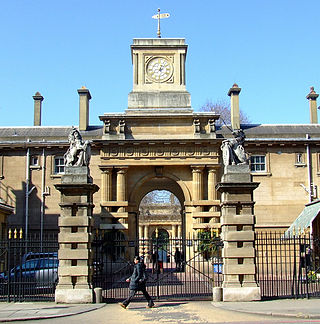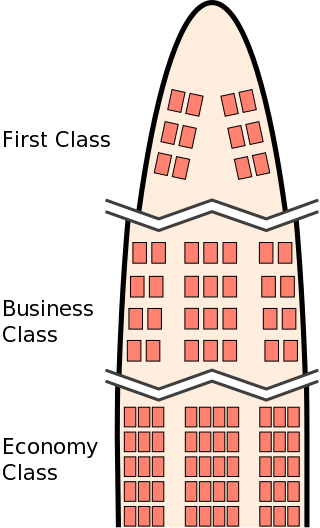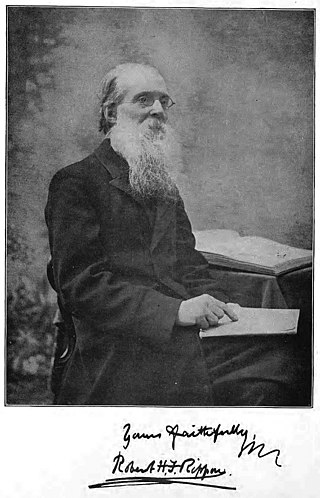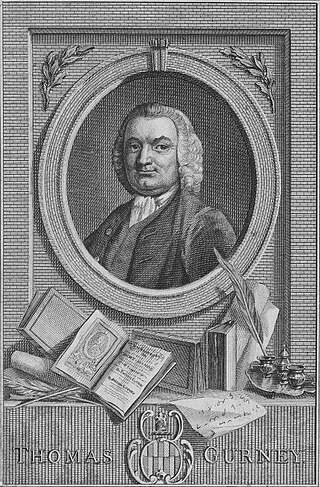
A stagecoach is a four-wheeled public transport coach used to carry paying passengers and light packages on journeys long enough to need a change of horses. It is strongly sprung and generally drawn by four horses although some versions are drawn by six horses.

A carriage is a two- or four-wheeled horse-drawn vehicle for passengers. Second-hand private carriages were common public transport, the equivalent of modern cars used as taxis. Carriage suspensions are by leather strapping or, on those made in recent centuries, steel springs. Two-wheeled carriages are usually owner-driven.

The Royal Mews is a mews, or collection of equestrian stables, of the British royal family. In London these stables and stable-hands' quarters have occupied two main sites in turn, being located at first on the north side of Charing Cross, and then within the grounds of Buckingham Palace.

A travel class is a quality of accommodation on public transport. The accommodation could be a seat or a cabin for example. Higher travel classes are designed to be more comfortable and are typically more expensive.

A coachbuilder or body-maker is a person or company who manufactures bodies for passenger-carrying vehicles. Coachwork is the body of an automobile, bus, horse-drawn carriage, or railway carriage. The word "coach" was derived from the Hungarian town of Kocs. A vehicle body constructed by a coachbuilder may be called a "coachbuilt body" or "custom body".

Rippon Lea Estate is a heritage-listed historic house and gardens located in Elsternwick, Melbourne, Victoria, Australia. It is in the care of the National Trust of Australia. It was added to the Australian National Heritage List on 11 August 2006.

Caledonian Sleeper is the collective name for overnight sleeper train services between London and Scotland, in the United Kingdom. It is one of only two currently operating sleeper services on the railway in the United Kingdom – the other being the Night Riviera, which runs between London and Penzance.
Railmotor is a term used in the United Kingdom and elsewhere for a railway lightweight railcar, usually consisting of a railway carriage with a steam traction unit, or a diesel or petrol engine, integrated into it.

Robert Henry Fernando Rippon was an English zoologist, entomologist and illustrator. He was a musician for a while but took a keen amateur interest in entomology and published a major multi-volume work on the birdwing butterflies, the Icones Ornithopterum (1898-1906). He also wrote Lilliebright; or, Wisdom and Folly: A Fairy Tale, and Other Tales (1856), and a semi-autobiographical novel, Victor; Or, Lessons of Life. a Tale Founded on Fact (1864).

Adam Richard Rippon is a retired American competitive figure skater and media personality. He is the 2018 Olympic bronze medalist in the team event, the 2010 Four Continents Champion, and 2016 U.S. National Champion. Rippon competed at the 2018 Winter Olympics in Pyeongchang, South Korea, where he finished 10th. At the junior level, Rippon is a two-time Junior World Champion, the 2007–2008 Junior Grand Prix Final Champion, and the 2008 U.S. junior national champion.

A coach is a large, closed, four-wheeled, passenger-carrying vehicle or carriage usually drawn by two or more horses controlled by a coachman, a postilion, or both. A coach has doors in its sides and a front and a back seat inside. The driver has a raised seat in front of the carriage to allow better vision. It is often called a box, box seat, or coach box. There are many types of coaches depending on the vehicle's purpose.

Yelloway Motor Services was a bus and coach company based in Rochdale.
Birch Brothers was a bus and coach operator in south east England.
A driving club was a 19th century membership club for the recreational practice of carriage driving.

The Long Island Museum of American Art, History, and Carriages, known as the Long Island Museum (LIM), is a nine-acre museum located in Stony Brook, New York. The LIM serves the Long Island community by preserving and displaying its collection of art, historical artifacts, and carriages; providing educational and public programming; and collaborating with a variety of other arts and cultural organizations.

Alfred John Keene (1864–1930) was a British watercolour artist working in Derby.

The Space City Home Network is an American regional sports network owned jointly by the Houston Rockets and Houston Astros.

Thomas Gurney (1705–1770) was an early English shorthand-writer and developer of shorthand style used by Charles Dickens.

The London Underground opened in 1863 with gas-lit wooden carriages hauled by steam locomotives. The Metropolitan and District railways both used carriages exclusively until they electrified in the early 20th century. The District railway replaced all its carriages for electric multiple units, whereas the Metropolitan still used carriages on the outer suburban routes where an electric locomotive at the Baker Street end was exchanged for a steam locomotive en route.
The Laycock Engineering Company Limited of Archer Road, Millhouses, Sheffield, Yorkshire, England was an engineering business established in 1884 by W S Laycock which made small and major components for railway rolling stock.

















